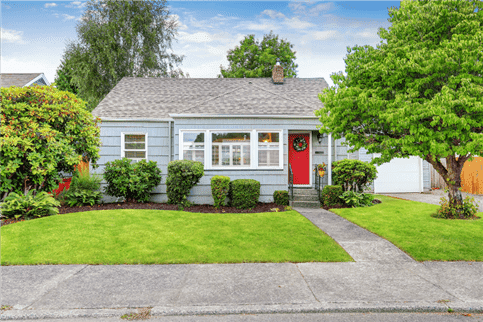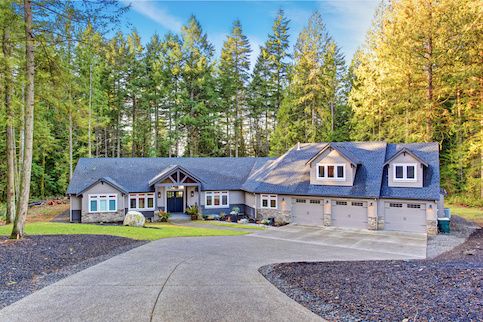One of the benefits of owning a home is you build equity. What is equity in a home? It’s the difference between what your home is worth and how much you owe on it. The advantage of equity is that you can convert it to cash by selling your home to turn it into profit or borrow it to pay for home improvements, college tuition or medical bills. Learn more about how home equity works and why it’s so valuable.
Key Takeaways:
- Your home equity represents how much of your home you own and is calculated by subtracting what you owe on the mortgage from its current value.
- You can borrow equity with a cash-out refinance, home equity loan or home equity line of credit.
- You build equity by paying down your mortgage and increasing the value of your home.
What Is Home Equity?
Equity is the difference between what your home is worth and how much you owe on it. Another way to think of equity is it’s the percentage of your home that you’ve paid off and own free and clear.
You can build equity two ways. Your equity will increase as you pay down your mortgage. Your equity also will grow if the value of your home increases. Though less common, equity can decrease if your home’s value drops below what you owe on it.
How To Calculate Your Home Equity
Calculate your equity by taking your home’s current market value and subtracting what you still owe on your mortgage. To estimate your home’s value, you can order a home appraisal or do some research into comparable home sales in your area.
What’s Your Goal?
Home Purchase
Home Refinance
Tap Into Equity
How Does Equity Work?
Here’s an example of how home equity works. Say you bought a home 15 years ago for $300,000 with a 5% down payment and a 30-year fixed-rate loan at 7%. Today, your home appraises for $400,000, and you’ve paid down your mortgage balance to $275,000. That gives you $125,000 in equity, or 31%.
How To Build Home Equity
Building equity is a natural function of paying your mortgage, but there are other ways to grow your equity.
Make A Larger Down Payment
Your down payment is the starting point for your home equity. The more you can afford for your down payment, the more home equity you start with. Say you buy a home for $400,000. If you make a 5% down payment, you’ll start with $20,000 in home equity. If you can afford a 10% down payment, you’ll have $40,000 in equity.
Make Your Monthly Mortgage Payments
As you make mortgage payments, you reduce what you owe on your home and build equity. Mortgages are amortized, which means you start out paying more in interest than principal. That changes over time, meaning you’ll build equity more quickly the further along you are in paying off your mortgage.
Pay More Than The Minimum
When you pay more than the minimum mortgage payment, the extra amount usually is applied to your balance. So, paying more than the minimum will build equity more quickly. Many homeowners do this by making biweekly payments instead of monthly payments. Paying half the monthly payment every other week comes to 26 payments a year, which is the same as 13 monthly payments. You also could pay an extra $100 a month, with that extra applied to your loan balance. This helps you build equity more quickly and can help you pay off your mortgage years ahead of schedule.
Renovate And Add Curb Appeal
Increasing the value of your home through renovations and improvements is another way to build equity. Reliable ways to increase your home’s value include adding an extra bedroom, renovating an outdated kitchen or adding a bathroom. Investing in landscaping and adding curb appeal to your home can help, too.
Own Your Home At Least 5 Years
Equity builds slowly, especially in the early years of repaying a mortgage. Owning your home for at least five years allows you to pay down your balance enough to build some equity. It also will increase the odds that your home’s fair market value will increase.
Ready To Become A Homeowner?
Get matched with a lender that can help you find the right mortgage.
How To Use Home Equity
If you’ve owned your home for a while, you may want to know how to use equity in your home. The primary value of equity is in converting it to cash, either by selling your home or borrowing it. Here are some common financial goals people take equity out of their homes to achieve.
Renovate Or Repair Your Home
Home repairs and renovations can increase the value of your home, so borrowing equity to pay for them makes sense to many homeowners. Borrowing equity is cheaper than using a credit card or personal loan. And repairs or renovations can increase your home’s value and build more equity.
Consolidate Debts
If you have high-interest debts such as credit cards, you can borrow equity to consolidate those debts. This can save you money because you’ll no longer need to make payments on that debt, and you’ll pay a lower interest rate.
Buy A New Home
If you’re ready to sell your home and upgrade to a new one, equity can help. Let’s say the home you’re selling is worth $420,000, and you’ve built $100,000 worth of equity. If you sell your home for that much, you’ll have a significant profit after repaying your mortgage and paying closing costs that you can use to make a down payment on your next home. Having that equity can help you make a larger down payment and start owning your new home with more equity or afford a more expensive home
Remove Private Mortgage Insurance
If you take out a conventional loan with a down payment that’s less than 20%, you’ll have to pay for private mortgage insurance. PMI protects the lender if you default on your loan but offers no protection to the borrower. The good news is you can cancel PMI once your equity reaches 20%. This can serve as an incentive for homeowners to build enough equity to allow them to refinance into a new loan with enough equity to avoid PMI.
Start A Business
If you need money to help start a business, borrowing your home equity can be an affordable way to raise startup funds.
Pay For School
The cost of education can be difficult for students and their families to afford. Borrowing equity can help you afford large tuition bills and pay a lower interest rate than you would with student loans.
Pay Other Major Expenses
Unexpected bills can happen to anyone. Maybe an accident left you or a family member with steep medical bills. Regardless of the expense, borrowing equity can save you money compared to other types of loans.
Supplement Your Retirement Income
If you’re 62 or older and own a home with a lot of equity, a reverse mortgage can supplement your income and help you stay in your home. A reverse mortgage converts your equity into cash, which you can receive as a lump sum, line of credit or series of regular payments. As you receive money, your equity decreases. You repay the loan when you sell your home or no longer live in it. If the owner dies, their heirs may sell the home to repay the reverse mortgage or refinance it into a standard mortgage.
Take The First Step To Buying A Home
Find a lender that will work with your unique financial situation.
How Not To Use Home Equity
Even though you can use your equity for whatever you want, most financial experts recommend against using it to pay for anything that doesn’t have guaranteed long-term value. That usually includes:
- Buying a car.
- Taking a vacation.
- Buying designer clothing or accessories.
- Everyday expenses.
- Investing in the stock market.
- Buying cryptocurrency.
How Can You Borrow Your Equity?
There are several ways you can borrow equity.
Cash-Out Refinance
With a cash-out refinance, you get a new mortgage based on your home’s current value, repay your current mortgage with the proceeds, and keep the difference in cash. Most lenders won’t let you borrow all your equity – you usually can borrow no more than 80% of your home’s value.
Say your home is worth $350,000 and you owe $250,000 on your mortgage. You can refinance 80% of your home’s current value, which is $280,000. After you pay off your current mortgage, you’d have $30,000 cash to use as you see fit and one monthly mortgage payment.
Home Equity Loan
A home equity loan is a second mortgage. You borrow your equity as a lump sum and make monthly payments on it. Most home equity loans have a fixed interest rate. You pay your home equity loan in addition to your primary mortgage, so you have two monthly payments to manage.
Home Equity Line Of Credit
A home equity line of credit, also known as a HELOC, uses your equity to establish a line of credit you can use as needed. It works like a credit card, with your equity establishing the credit limit. HELOCs have a draw period during which you can borrow money as needed and make payments with a variable interest rate on the amount you borrow. When the draw period expires, you can no longer withdraw funds and must make payments until the HELOC is paid off.
Shared Equity Agreement
With a shared equity agreement, you sell a percentage of your home to an investor in exchange for a lump sum. You don’t make monthly payments – the investor is compensated when the agreement expires or you sell the home.
Pros And Cons Of Borrowing Your Home Equity
Borrowing your home equity can be a helpful way to access money, but it comes with tradeoffs. Let’s look at some of the advantages and drawbacks of borrowing equity.
Borrowing Your Home Equity: Pros and Cons
| Pros | Cons |
|---|---|
| There are no restrictions on what you can use the money for. | You could lose your home if you default on the loan. |
| You’ll pay lower interest rates than with credit cards and personal loans. | You’ll be taking on more debt and you could have an extra monthly payment. |
| You can use the money to increase the value of your home. | You may have to pay closing costs. |
| Interest is tax-deductible if you’re using the loan to make home improvements. | You reduce your total equity. |
FAQ
Here are answers to common questions about home equity.
The Bottom Line
Understanding equity can help you achieve your financial goals as a home buyer or homeowner. The equity you build can help you consolidate high-interest debts, pay for renovations, or make updates that increase your home’s value. However, it’s important to explore your options and choose the right type of home equity financing for your needs.
Victoria Araj contributed to the reporting of this article.

Rory Arnold
Rory Arnold is a Los Angeles-based writer who has contributed to a variety of publications, including Quicken Loans, LowerMyBills, Ranker, Earth.com and JerseyDigs. He has also been quoted in The Atlantic. Rory received his Bachelor of Science in Media, Culture and Communication from New York University. He also completed the SoFi/Coursera Fundamentals of Personal Finance Specialization consisting of five courses: Introduction to Personal Finance, Saving Money for the Future, Managing Debt, Fundamentals of Investing, and Risk Management in Personal Finance.








